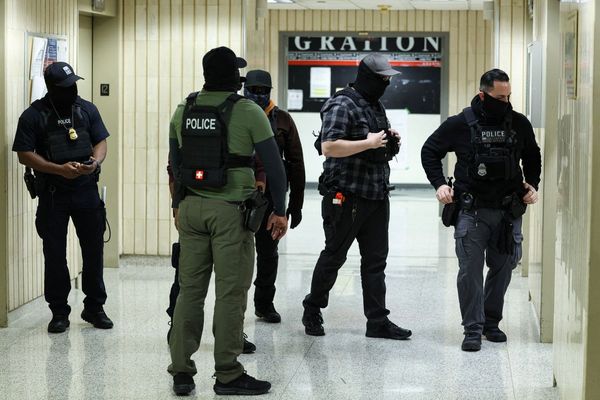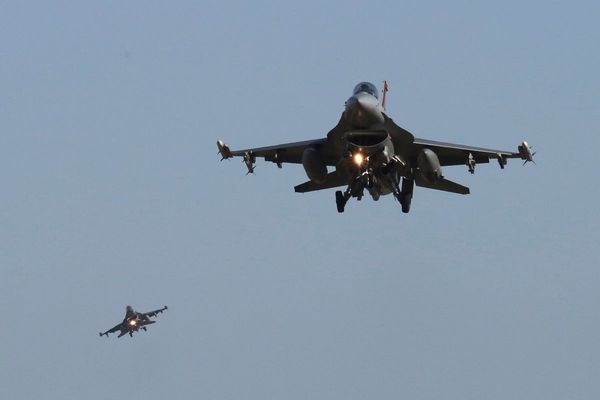
Closing summary
… and on that note, it’s a wrap!
Senior German politicians called for a stronger reaction to drone sightings over European airports, with Bavarian PM Markus Söder urging police to shoot them down (10:57) after overnight disruptions at Munich airport (9:55).
Drone sightings will be discussed during this Saturday’s meeting of EU interior ministers in Munich, which originally had been called to talk about migration, but now will include a conversation on drone defence, with German minister Alexander Dobrindt warning the EU faces “a race” between drone attacks and defences, which it “must win.” (15:25).
The issue dominates the European defence debate after drone sightings in several European countries, including significant disruptions in Denmark last week, prompting Sweden to urge the EU to simplify its procurement standards (12:45).
During German celebrations of the 35th anniversary of its reunification in 1990 (10:11), with chancellor Friedrich Merz issued a call for “renewed unity” amid growing challenges the country faces (14:30).
Elsewhere,
Voters in the Czech Republic go to the polls today and tomorrow in what protagonists and analysts describe as a pivotal parliamentary election that could lead to clashes with the EU on issues from migration to climate policy (14:06).
Populist billionaire and former prime minister Andrej Babiš is on the brink of making a comeback, signalling potential changes in Prague’s policy towards Ukraine, among other things – but his win is not certain (16:02, 16:38).
The polling stations are open until 10pm local time tonight, and will reopen again tomorrow from 8am to 2pm local time (1pm BST), with results expected this weekend.
And that’s all from me, Jakub Krupa, for today.
If you have any tips, comments or suggestions, email me at jakub.krupa@theguardian.com.
I am also on Bluesky at @jakubkrupa.bsky.social and on X at @jakubkrupa.
Czechs split over where possible return of ‘Trumpist’ Babiš could lead
in Prague
What worries critics and observers at home and abroad, however, is where Andrej Babiš’s catch-all, populist promises may take him now; whether, like the US president whose style (if not policies) he so appreciates, his second term may make his first look tame.
Days before an election that the outgoing centre-right prime minister, Petr Fiala, has warned could determine whether the Czech Republic “remains firmly part of the west, or drifts off toward the east”, some are sure the worst is yet to come.
“It certainly looks like [Babiš is] going to win. We only hope he won’t be able to form a government,” said Venuše Rýdl, 68, a voter in the Prague suburb of Modřany, who was unpersuaded by Babiš’s promises to cut taxes, cap energy prices and lower the pension age.
Her husband, Rudolf, 70, agreed. “We don’t believe Babiš, and we don’t trust him,” he said. “He’s a populist and he’s out for himself. He showed it last time he was in government – why would this time be different? He would be bad for the country.”
If the polls are to be believed, however, many do not share their pessimism. Jan, a smart 76-year-old former small business owner about 60 miles (100km) away in north Bohemia, is one of them. “He does things for ordinary people,” he said. “He makes an effort for us: last time, he raised pensions, and lowered transport fares.”
Babiš “is not arrogant or snotty at all”, Jan added. “I’ve met him. He keeps his promises. And I like that he surrounds himself with competent people.” Vladimir Tykvart, 72, agreed critics had got the election frontrunner wrong.
“He’s not pro-Russian – that’s just nonsense,” Tykvart said. “He’s already been prime minister, and he didn’t try make us like Russia, or Slovakia, or Hungary. And I don’t believe for one moment he would lead us away from the EU or from Nato.”
Quite where he would lead the country, however, is unclear. Babiš, whose wealth comes from a sprawling empire of farming, food processing and fertiliser firms, started his Action of Dissatisfied Citizens (ANO, meaning Yes in Czech) party in 2011.
Back then, it was a centrist anti-corruption movement. It has since swung left, to capture disillusioned, mainly older social democrats, often in poorer rural areas, and then radically right, in search of the burgeoning conservative vote.
Few supporters seem concerned by the trial Babiš faces for an alleged $2m EU subsidy fraud from 2007, when he allegedly took Stork Nest, a farm and hotel complex outside Prague, out of his conglomerate to make it eligible for a small business subsidy.
Babiš, who has been twice acquitted of the charges in two previous trials, has always denied wrongdoing, describing the allegations as politically motivated.
The Prague high court earlier this year overturned the most recent acquittal and ordered a retrial.
Read Jon’s report from Prague in full here:
'We are on edge of potential major conflict, and not equipped to deal with it,' EU sanctions czar warns
in Dublin
The EU’s Russia sanctions czar has warned that Europe is “on the edge of potential major conflict” without being equipped to deal it.
David O’Sullivan has been the EU sanctions envoy since 2023 playing a pivotal international role in drawing up the, now 19th, rounds of sanctions to try and squeeze Vladimir Putin into ending the war in Ukraine.
He told the Institute of International and European Affairs in Dublin:
“When I wake up in the morning, the first thing I check is how many people were killed in Ukraine yesterday. This is not a test. This is a real conflict, and this is testing us.
And we’ve now seen the drones in Denmark, in Munich, in Estonia, the overflights. We are on the edge of a potential major conflict, and we’re not equipped to deal with it, it’s as simple as that. I’m not even going to talk about our defence forces, but as Europe, we’re not equipped to deal with it, and it is absolutely right that we put this forward as a critical agenda.Unfortunately, yes, it means we have to spend more money on defence.
I would rather we spent it on schools and on hospitals and other things, but frankly, without spending it on the defence, we won’t be able to spend it on the schools and the hospitals and they and the good things that we need for our people.”
Czech politicians cast their votes in closely-watched parliamentary election
Back to the Czech election (14:06), candidates made last-ditch appeals to voters on Friday morning, with Andrej Babiš handing out doughnuts in Ostrava, before casting his vote in the city.
Babiš is an ally of Hungary’s Viktor Orbán in the Patriots for Europe group in the European parliament and has taken an ambivalent line on aid to Ukraine – a departure from Petr Fiala’s government, which quickly took a firm stance to support Kyiv after Russia’s invasion in 2022.
While donating less than others financially, the Czechs were among the first to provide tanks and fighting vehicles and they set up the so-called “Czech initiative” pulling together traders and defence officials to find millions of artillery rounds around the world for Kyiv with financing from western countries.
Babiš has pledged to end the ammunition project, saying it is overpriced. He wants Nato and the EU to handle Ukraine.
“We don’t have the money here for our people. Our programme is for a better life for Czech citizens … We are not in Ukraine,” Babiš, 71, said in a debate on Wednesday on CNN Prima News.
Polls point to Babiš’s ANO party winning more than 30% of the vote, about 10 points more than Fiala’s Spolu coalition. But, even with a small ally called Motorists, it will probably not get a majority in the 200-seat lower house of parliament.
Drone threats to be discussed at EU interior ministers summit this weekend, German minister says
German interior minister Alexander Dobrindt said that the last night’s appearance of drones over the Munich airport will be discussed by EU interior ministers during their meeting in the Bavarian capital this weekend.
The meeting had been originally billed as a migration summit, but will now also cover the emerging threats of drones. EU internal affairs and migration commissioner Magnus Brunner is expected to attend.
Speaking on the sidelines of the German Unity Day commemorations in Saarbrücken (14:30), Dobrindt said the meeting will allow for broader talks on drone detections and defence plans of the EU that are being prepared with the European Commission.
“We are in a race between the threat from drones and the defence against drones. We want and must win it,” he told reporters.
He confirmed that the first sighting of a drone over Munich airport was reported around 9.15pm last night, with further reports inside the restricted zone around the airport.
He confirmed that it was “not yet possible” to determine how many drones were involved, or who operated them and with what motivation behind it.
In recent weeks, other drone sightings were reported over Germany, most notably in Schleswig-Holstein, which included quadrocopters and larger “fixed-wing aircraft”, he said, with the latter posing “more of a danger.”
“What is clear, however, is that drone sightings are increasing, including over critical infrastructure,” he said, saing that it required a political response.
Dobrindt said he will be pushing for changes to the aviation laws to allow for a military response to drones to “avert danger.”
Merz calls for 'renewed unity' in speech warning of challenges Germany faces 35 years after reunification
German chancellor Merz marked the 35th anniversary of the German reunification, calling for “renewed unity” as the country braces for new challenges.
In a speech in Saarbrücken, Merz remarked that in the not-too-distant future – well, in 10 years – Germany will have been united for as long as it had been divided, as he celebrated what he insisted remained a successful unification process.
But he also warned about growing polarisation in the German society, drawing inspiration from Giuseppe Tomasi di Lampedusa’s “The Leopard” as he warned that “much will have to change if things are to remain as good or improve.”
He said that the German nation faced “an important, perhaps decisive” moment in its history, as “the appeal of what we can the west is noticeably declining” and “new alliances of autocracies are forming against us, attacking liberal democracy as a way of life.”
“Therefore, we must regain the ability to defend our freedom,” he said to applause from the audience.
Merz continued with words of caution that “years of irregular, undirected migration to Germany have polarised our country and dug new divisions into our society.”
He also stressed the importance of European integration, urging the bloc to cut regulation and refocus on “economic competitiveness,” but also stressing that the EU will either find strength in its unity or it will struggle due to internal divisions.
“We in Germany know: when Europe is doing well, Germany is doing well, and when Europe is not doing well, Germany is doing worse, too.”
In a nice touch, his guest of honour, French president Emmanuel Macron, opened his speech in German as he spoke about the importance of the relations between the two countries.
Updated
Parliamentary elections get under way in Czech Republic
Voters in the Czech Republic go to the polls today and tomorrow in what protagonists and analysts describe as a pivotal parliamentary election that could lead to clashes with the EU on issues from migration to climate policy.
My colleague Jon Henley has this helpful primer for you:
The vote will be keenly watched in Brussels, which is nervously considering the possibility of a third anti-EU agitator in central Europe alongside Hungary and Slovakia, with potential implications for the bloc’s support for Ukraine.
Four years after losing to an unwieldy coalition united against him, the billionaire former prime minister Andrej Babiš – the “Czech Trump” – and his Action of Dissatisfied Citizens party (ANO, or Yes in Czech) seem assured of first place.
The populist ANO, a member of Viktor Orbán’s nation-first Patriots for Europe group, is polling 10 points higher than the centre-right Spolu (Together) alliance led by the prime minister, Petr Fiala. It won European and regional elections in 2024 and is on track to score about 30%.
While no party is forecast to win a majority in the 200-seat lower house of parliament, ANO – assuming it does finish first – will begin coalition talks with a range of smaller parties to try to find the parliamentary backing it will need to form a cabinet.
It is not certain to succeed. But if it does, parties such as the anti-EU, pro-Russian Freedom and Direct Democracy (SPD) and Stačilo! or the upstart Motorists for Themselves would demand significant policy concessions in exchange for their votes.
Updated
Classical music lovers tune in to watch 'Olympic Games for pianists' as Chopin competition begins in Warsaw
In other news … it’s perhaps not the usual definition of a TV blockbuster, capable of attracting millions of viewers.
Still, much of Poland will be glued to their screens for the next three weeks after the twists and turns of the latest edition of a prestigious piano competition celebrating Poland’s composer and virtuoso, Fryderyk Chopin.
The 19th edition of the International Fryderyk Chopin Piano Competition started yesterday. It will see 84 pianists from 20 countries – narrowed down from over 640 submissions – contending for the top prize, often seen as a golden ticket to play in the world’s greatest concert halls.
The event, resembling the Olympic Games for pianists, takes place every five years and draws thousands of classical music lovers to the Polish capital, with tickets selling out a year in advance.
The host nation has 13 participants, but the US pianist Eric Lu, Canada’s Kevin Chen and Korea’s Hyuk Lee are seen as some of the favourites.
The competition is broadcast by Poland’s public broadcaster, TVP, and streamed online worldwide on YouTube by the Chopin Institute. The winner’s show concerts start on 21 October.
You can watch this morning’s session here.
For more creative TV picks like this, sign up for our The Guide culture newsletter by 1pm UK time.
Updated
Drone threat 'more and more difficult,' German interior minister says, as he warns its 'wake-up call' for Europe
German interior minister Alexander Dobrindt said that the temporary closure of Munich airport after drone sightings was a “wake-up call” about the threat from drones, which have caused a string of similar aviation disruptions across Europe, AFP reported.
“The race between the threat from drones and the defence against drones is becoming more and more difficult,” he told Bild newspaper, adding that “more financing and research” on the issue was urgently needed at the national and European levels.
Sweden urges EU to simplify drone procurement standards
Separately, Sweden’s prime minister Ulf Kristersson called on the European Union to simplify procurement standards for drones while maintaining that responsibility for strengthening anti-drone capabilities should lie with individual member states rather than the bloc as a whole, Reuters reported.
“The EU is not a defence organisation. … Every country needs to build up these capabilities, and then we need to cooperate very closely to be able to detect drones,” Kristersson told Reuters in an interview in Copenhagen late on Thursday.
He added that “EU has a very good potential of simplifying, for example, simplifying procurement standards.“
Sweden, home to defence manufacturer Saab, which specializes in anti-drone technology, has emphasised that decisions about equipping national armed forces should align with Nato targets rather than fall under EU jurisdiction.
Kristersson also noted that EU nations are prepared to act decisively.
“We don’t do anything carelessly, but we won’t hesitate to use the force needed to bring down vehicles or threats that actually violate our (borders).”
German newspaper Bild is reporting, via sources close to the investigation, that at least one of “multiple” drones reported over Munich airport last night was “larger” than usual, prompting further questions about the nature of the incident.
This report has not been confirmed by authorities so far.
in Berlin
Munich was already on edge this week after its popular Oktoberfest was closed temporarily because of a bomb threat and the discovery of explosives in a residential building in the north of the city. Authorities later determined there was no political or religious motive behind the attack targeting the alleged perpetrator’s family.
The drone incident highlighted the vulnerability of critical European infrastructure and occurred before German Unity Day on Friday, a public holiday with increased travel because of the long weekend, and the final weekend of Oktoberfest.
Updated
'Our police must be able to shoot drones down immediately,' Bavarian PM says after Munich disruption
Bavarian prime minister Markus Söder has joined the calls to strengthen Germany’s air defences, telling Bild that “our police must be able to shoot drones down immediately,” instead of “waiting”.
CSU leader Söder added that the issue will be discussed during the Bavarian cabinet meeting on Tuesday, and a draft law will be fast-tracked to change the regulations accordingly.
“Our infrastructure must remain functional at all times. We need sovereignty over our airspace,” he told Bild after last night’s drone sightings over Munich airport.
Munich is the capital of Bavaria.
Germany marks 35th anniversary of reunification
The Munich drone sightings come at a special time for Germany, which marks the German Unity Day, the 35th anniversary of the reunification in 1990, today.
Here is how the Guardian reported the news 35 years ago:
“Germany, an economic and political colossus in the heart of Europe, was reborn today on the stroke of midnight as a single country after more than 45 years of division.
More than a million people witnessed the historic end of two separate German states as the Federal Republic’s black, red and gold flag, complete with rampant eagle, was brought in by 20 young people from both parts of Berlin and raised on a special flagstaff in front of the Reichstag, dedicated To The German People.
The Liberty Bell pealed throughout Berlin and President Richard von Weizsäcker proclaimed: “In free self-determination we have completed the unity and freedom of Germany. We want to serve world peace in a united Europe.”
Fireworks soared over the nearby Brandenburg Gate, until recently split from the West by the now demolished Berlin Wall, and lit up the sky in cities across the new country of 77 million people.
In an earlier ceremony, tinged with some sadness, the postwar division of Europe finally came to an end as the East German flag, with its old communist insignia, was lowered for the last time and the state formed in 1949 passed into oblivion to the sound of Beethoven’s Ninth Symphony and rock music all along Unter Den Linden.”
French president Emmanuel Macron will be the guest of honour today (a choice that was not very popular with former chancellor, Angela Merkel, as it turns out) at the main event set to start later today in Saarbrücken.
I will keep an eye on the celebrations there as we are likely to hear from him and the German chancellor, Friedrich Merz.
Updated
CDU/CSU parliamentary leader calls for 'immediate' work on drone defence system
Jens Spahn, leader of the ruling CDU/CSU party’s parliamentary grouping in the Bundestag, said the incident highlighted the need for “an integrated and agile” system that would allow to neutralise drones “immediately.”
“We must establish a functioning drone defence system as quickly as possible,” he told local Bavarian media.
Morning opening: Munich drone sightings add urgency to discussions on EU drone wall
Munich has joined a growing list of European airports disrupted by drone sightings in recent weeks, with 17 flights cancelled, 15 diverted elsewhere, and thousands of passengers facing disruption to their travel overnight.
Several people reported seeing drones near the airport, with a further sighting later confirmed within the restricted zone, forcing air traffic control to suspend operations pending investigation.
It remains unclear how many, or of what type, drones were involved.
The disruption comes just before the closing weekend of the Oktoberfest beer festival, which had already seen disruption earlier this week due to a bomb threat in the city.
Deutsche Flugsicherung GmbH, the German air navigation service provider responsible for the German airspace, said last week that drone sightings near airports are on the up, with 144 reported so far in 2025, compared with 113 in 2024, and 99 in 2023, Süddeutsche Zeitung reported.
Expect the sightings and the associated disruption to reignite the debate about Europe’s air defences, just after the EU leaders’ meeting in Copenhagen revealed some disagreements – mostly along the geographical lines – about the newly proposed “drone wall” project.
I will bring you all reactions here.
It’s Friday, 3 October 2025, it’s Jakub Krupa here, and this is Europe Live.
Good morning.
Updated







